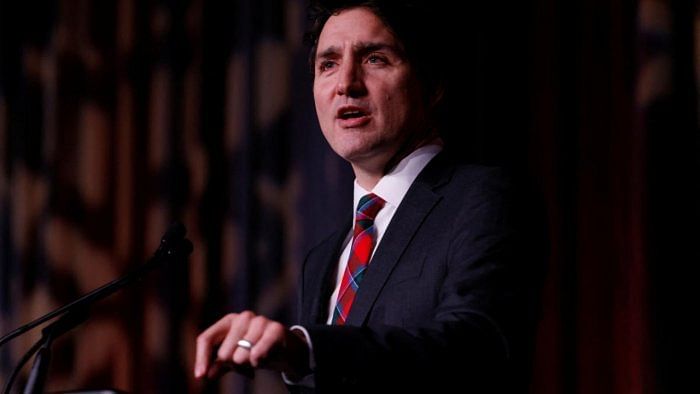
Trudeau said he had spoken with Biden on Saturday afternoon. 'Canadian Forces will now recover and analyze the wreckage of the object,' he said in his Twitter post.
Credit: Reuters Photo
India-Canada relations have broken down over an issue that is serious but not so difficult that they could not have resolved it before it came to the tit-for-tat expulsions of their diplomats, including of the Indian High Commissioner to Canada. The Canadian allegations that top Indian government officials were involved in the killing of Hardeep Singh Nijjar, a pro-Khalistani activist, have confronted Delhi since September 2023. While going public may have been a deliberate ploy by the politically-embattled Canadian Prime Minister Justin Trudeau, Delhi's decision to play hardball with him, and push back against the allegations, was likely centred on the hope of shaming him and Canada for putting up Khalistani extremists, some of whom India has designated as terrorists. But Delhi seems to have miscalculated on two counts: Ottawa's resolve to get to the bottom of the case; and concurrently, the surfacing of an alleged role of India’s RAW in the foiled plot to kill Khalistani activist Gurpatwant Singh Pannun in the US. American and Canadian investigators believe the two cases are linked. Delhi's decision to treat the US case with much deference and agreeing to set up an internal investigation did not have the desired effect of delinking the two.
As has been evident since the details of the Pannun case became public through the framing of charges in a New York court against an Indian national and his alleged Delhi-based handler in the RAW, the two North American allies appear to have closed ranks, sharing details of their respective cases and investigations. The Canadian probe clearly involved phone surveillance of the suspected Indian officials posted at the High Commission in Ottawa, and as per a report in the Washington Post, led all the way up to Union Home Minister Amit Shah and the then RAW boss Samant Goel. The Pannun case, meanwhile, has drawn in National Security Adviser Ajit Doval by name in a civil suit by the alleged target of that plot, making it risky for him to travel to that country. Delhi has now arrested the alleged handler in the Pannun case.
Whether it is Trudeau playing domestic politics or not, the Canadian allegations paint India in poor colour. It is also apparent that the Five Eyes alliance – of the US, UK, Canada, Australia and New Zealand – which India had once hoped to join, no longer trusts Delhi. The saga points to misplaced confidence in the Indian security apparatus of its covert capabilities. The argument that the US and Israel, too, carry out transnational hit jobs against enemy actors misses the point that they are not known to do so on the territory of friends. By continuing to stonewall the Canadians with the demand for “evidence”, Delhi risks sounding like Pakistan whenever India presents it with inputs about the terror infrastructure on its side. India must take the allegations seriously, conduct its own investigation as it has done in the Pannun case so far, and work to normalise ties with Canada.